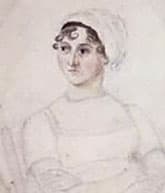Jane Austen
THE AUTHOR | BIBLIOGRAPHY | VIEWS AND QUOTES

JANE AUSTEN portrait, circa 1810
Born
Hampshire, England, 1775
Died
Hampshire, England, 1817
Places lived
Steventon, Hampshire, England; Winchester, Hampshire
Nationality
English
Publications
Novels
Genres
Literary, satire, romance
Writing language
English
Literature
• Sense and Sensibility (1811)
• Pride and Prejudice (1813)
• Mansfield Park (1814)
• Emma (1815)
Novels
• Sense and Sensibility (1811)
• Pride and Prejudice (1813)
• Mansfield Park (1814)
• Emma (1815)
• Northanger Abbey (1817)
• Persuasion (1817)
British Literature
• Sense and Sensibility (1811)
• Pride and Prejudice (1813)
• Mansfield Park (1814)
• Emma (1815)
• Persuasion (1817)
• Northanger Abbey (1817)
On books, writers and writing
1807
We are reading [Sarah Burney's] "Clarentine," and are surprised to find how foolish it is. I remember liking it much less on a second reading than at the first, and it does not bear a third at all. It is full of unnatural conduct and forced difficulties, without striking merit of any kind.
— letter to sister Cassandra
1814
Walter Scott has no business to write novels, especially good ones. It is not fair. He has fame and profit enough as a poet, and should not be taking the bread out of the mouths of other people.
I do not like him, and do not mean to like "Waverley" if I can help it, but fear I must.
I am quite determined, however, not to be pleased with Mrs. [Jane] West's "Alicia De Lacy," should I ever meet with it, which I hope I shall not. I think I can be stout against anything written by Mrs. West. I have made up my mind to like no novels really but Miss [Maria] Edgeworth's, yours, and my own.
— letter to niece Anna Austen Lefroy
1815
My greatest anxiety at present is that this fourth work [Emma] should not disgrace what was good in the others. But on this point I still do myself the justice to declare that, whatever may be my wishes for its success, I am strongly haunted with the idea that to those readers who have preferred "Pride and Prejudice" it will appear inferior in wit, and to those who have preferred "Mansfield Park" inferior in good sense.... I am quite honoured by your thinking me capable of drawing such a clergyman as you gave the sketch of in your note of Nov. 16th. But I assure you I am not. The comic part of the character I might be equal to, but not the good, the enthusiastic, the literary. Such a man's conversation must at times be on subjects of science and philosophy, of which I know nothing; or at least be occasionally abundant in quotations and allusions which a woman who, like me, knows only her own mother-tongue, and has read little in that, would be totally without the power of giving.... I think I may boast myself to be, with all possible vanity, the most unlearned and uninformed female who ever dared to be an authoress.
— letter to J.S. Clark
1816
You are very kind in your hints as to the sort of composition which might recommend me at present, and I am fully sensible that an historical romance, founded on the House of Saxe-Cobourg, might be much more to the purpose of profit or popularity than such pictures of domestic life in country villages as I deal in. But I could no more write a romance than an epic poem. I could not sit seriously down to write a serious romance under any other motive than to save my life; and if it were indispensable for me to keep it up and never relax into laughing at myself or at other people, I am sure I should be hung before I had finished the first chapter. No, I must keep to my own style and go on in my own way; and though I may never succeed again in that, I am convinced that I should totally fail in any other.
— letter to J.S. Clark
THE AUTHOR | BIBLIOGRAPHY | VIEWS AND QUOTES



